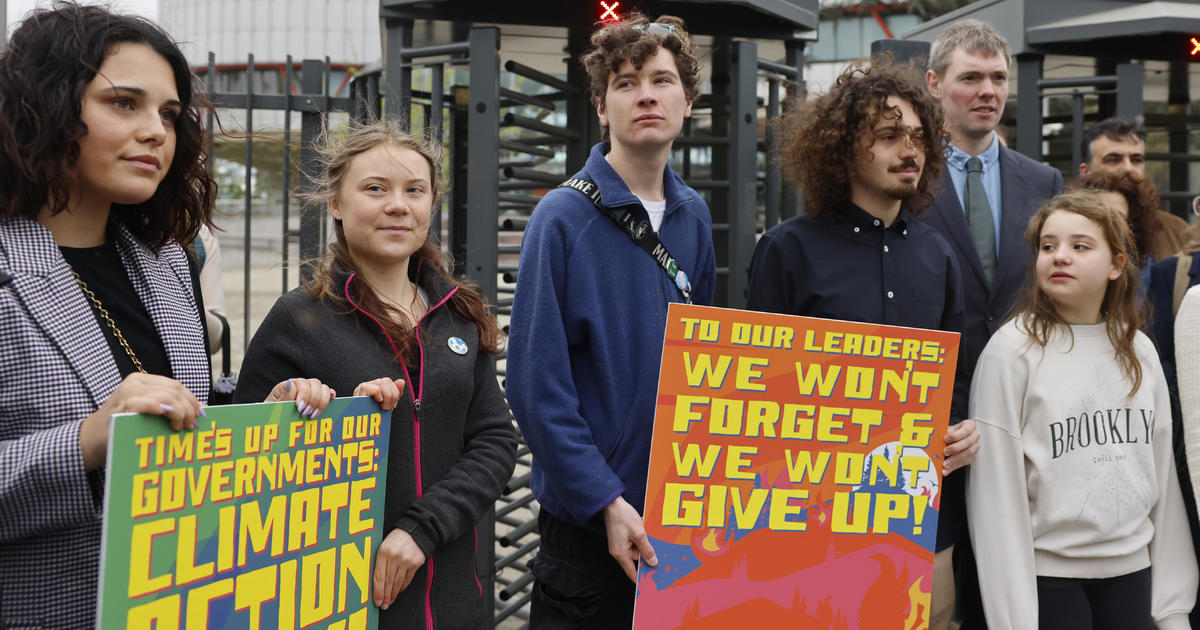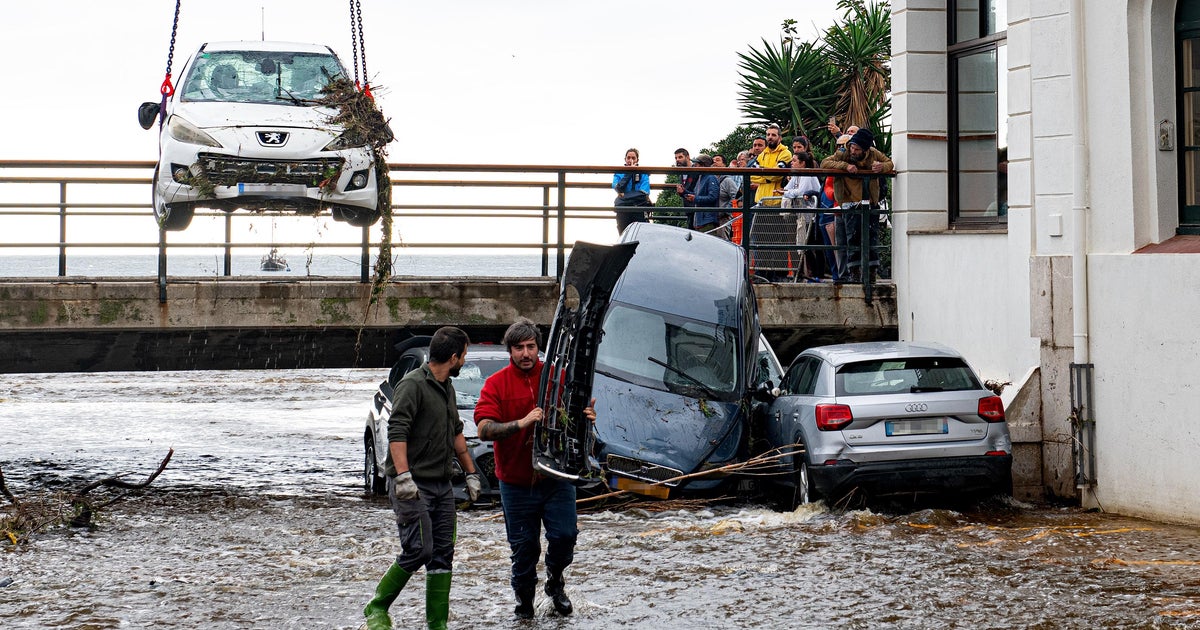CBS News
European nations must protect citizens from climate change impacts, EU human rights court rules

Strasbourg, France — Europe’s highest human rights court ruled Tuesday that its member nations have an obligation to protect their citizens from the ill effects of climate change, but it still threw out a high-profile case brought by six Portuguese youngsters aimed at forcing countries to reduce greenhouse gas emissions.
The European Court of Human Rights sided with more than 2,000 Swiss members of the Senior Women for Climate Protection group, who sought similar measures to the Portuguese youths, in a mixed session of judgements handed down on Tuesday. In a third, a French mayor similarly seeking stronger government efforts to combat climate change was also defeated.
Lawyers for all three had hoped the Strasbourg court would find that national governments have a legal duty to make sure global warming is held to 1.5 degrees Celsius (2.7 degrees Fahrenheit) above pre-industrial levels, in line with the goals of the Paris climate agreement that those governments signed onto.
“I really hoped that we would win against all the countries, so obviously I’m disappointed that this didn’t happen,” said 19-year-old Sofia Oliveira, one of the Portuguese plaintiffs. “But the most important thing is that the Court has said in the Swiss women’s case that governments must cut their emissions more to protect human rights. So, their win is a win for us, too, and a win for everyone!”
Jean-Francois Badias/AP
Swedish climate activist Greta Thunberg agreed with that positive assessment, saying outside the European court on Tuesday that the ruling was “only the beginning of climate litigation” and noting that, “all over the world more and more people are taking their government to court, holding them responsible for their actions.”
In a reference to its fundamental Convention of Human Rights, “the court found that Art. 8 of the Convention encompasses a right for individuals to effective protection by the state authorities from the serious adverse effects of climate change on their lives, health, well-being and quality of life.”
Judgments from the European Court of Human Rights set a legal precedent against which future lawsuits would be judged in the Council of Europe’s 46 member states.
Although activists have had successes with lawsuits in domestic proceedings, this was the first time an international court ruled on climate change.
“This is a turning point,” said Corina Heri, an expert in climate change litigation at the University of Zurich. She said Tuesday’s decision confirmed for the first time that countries have an obligation to protect people from the effects of climate change and will open the door to more legal challenges.
Activists have increasingly turned to courts to force efforts by governments to tackle climate change. In August 2023, a Montana court ruled — in a first-of-its-kind trial in the U.S. — in favor of a group of young activists who had accused state agencies of violating their rights to a clean environment.
Ahead of the ruling on Tuesday, a large crowd gathered in front of the court building in Strasbourg to cheer and wave flags, including Thunberg, who was coming off of multiple arrests during a demonstration in The Hague over the weekend.
The decisions have “the potential to be a watershed moment in the global fight for a livable future. A victory for any of the three cases would be one of the most significant developments on climate change since the signing of the Paris Agreement” said Gerry Liston, a lawyer with the Global Legal Action Network, which is supporting the Portuguese students.
The European Union, which doesn’t include Switzerland, currently has a target to be climate-neutral by 2050. Many governments have said that meeting a 2030 goal would be economically unattainable.
The groups were confident that the 17 judges would rule in their favor, but the mixed decision could undermine a previous ruling in the Netherlands. In 2019, the Dutch Supreme Court ordered the government to cut emissions by at least 25% by the end of 2020 from benchmark 1990 levels.
The Urgenda decision, referring to the climate group that brought the case, relied on the European Convention of Human Rights. It could be overturned if Tuesday’s decision concludes there is no legal obligation for countries to combat climate change.
“A court ruling is binding on all countries,” said Dennis van Berkel, who represented Urgenda in the Netherlands.
Together with five more young people, 16-year-old André dos Santos Oliveira took Portugal and 32 other nations to court, arguing the failure to stop emissions violated their fundamental rights. Their case was thrown out.
“The extreme heat waves, the rainfalls, followed by heat waves, it is just choking us with greenhouse effects. And what worries me is the frequency in which they started happening more and more. That’s what really scared me. And, I thought to myself, well, what can I do?” she said.
But judges ruled in favor of a group of Swiss retirees also demanding their government do more. Senior Women for Climate Protection, whose average age is 74, say older women’s rights are especially infringed on because they are most affected by the extreme heat that will become more frequent due to global warming.
Earth shattered global annual heat records in 2023, flirted with the world’s agreed-upon warming threshold, and showed more signs of a feverish planet, Copernicus, a European climate agency, said in January.
In all three cases, lawyers argued that the political and civil protections guaranteed by the European Convention on Human Rights are meaningless if the planet is uninhabitable.
Switzerland is not alone in being affected by global warming, said Alain Chablais, representative of the country at last year’s hearings. “This problem cannot be solved by Switzerland alone.”
Acknowledging the urgency of the climate crisis, the court fast-tracked all three cases, including a rare move allowing the Portuguese case to bypass domestic legal proceedings.
CBS News
1 monkey recovered safely, 42 others still remain on the run from South Carolina lab

One of 43 monkeys bred for medical research that escaped a compound in South Carolina has been recovered unharmed, officials said Saturday.
Many of the others are still located a few yards from the property, jumping back and forth over the facility’s fence, police said in a statement.
The Rhesus macaques made a break for it Wednesday after an employee at the Alpha Genesis facility in Yemassee didn’t fully lock a door as she fed and checked on them, officials said.
The monkeys on Friday were exploring the outer fence of the Alpha Genesis compound and were cooing at the monkeys inside. The primates continued to interact with their companions inside the facility on Saturday, which is a positive sign, the police statement said.
Yemassee Police Department
Alpha Genesis CEO Greg Westergaard relayed that efforts to recover all the animals will persist throughout the weekend and for as long as it takes, the statement said.
Westergaard told CBS News on Thursday that a caretaker inadvertently failed to secure a door at the enclosure, allowing the monkeys to roam free.
“It’s really like follow-the-leader. You see one go and the others go,” he said. “It was a group of 50 and 7 stayed behind and 43 bolted out the door.”
Westergaard acknowledged that it would be a long process to get them back and that they didn’t want to chase the monkeys because that would spook them and make them run away.
“We’ve got them very close,” he told CBS News. “This is all like what we want to see.”
The monkeys are about the size of a cat. They are all females weighing about 7 pounds.
Alpha Genesis, federal health officials and police all said the monkeys pose no risk to public health. The facility breeds the monkeys to sell to medical and other researchers.
Alpha Genesis provides primates for research worldwide at its compound in Yemassee, about 50 miles (80 kilometers) northeast of Savannah, Georgia, according to its website.
CBS News
American nurse killed in Budapest while on vacation, Hungarian police arrest suspect

A 31-year-old American tourist was killed while on vacation in Hungary’s capital, and the suspect, a 37-year-old Irish man, has been arrested, Hungarian police said Saturday.
The victim, Mackenzie Michalski was reported missing on Nov. 5 after she was last seen at a nightclub in central Budapest.
A Facebook group called “Find Mackenzie Michalski,” created on November 7, said Michalski, went by “Kenzie.” The group confirmed her death in a statement on Friday, thanking U.S. and Hungarian authorities for “their prompt attention, diligence, care, and consideration.”
Police launched a missing person investigation and reviewed security footage from local nightclubs where they observed Michalski with a man later identified as the suspect in several of the clubs the night of her disappearance.
Police detained the man, an Irish citizen, on the evening of Nov. 7. Investigators said that Michalski and the suspect met at a nightclub and danced before leaving for the man’s rented apartment. The man killed Michalski while they were engaged in an “intimate encounter,” police said.
The suspect, whom police identified by the initials L.T.M., later confessed to the killing but said it had been an accident. Police said that he had attempted to cover up his crime by cleaning the apartment and hiding Michalski’s body in a wardrobe before purchasing a suitcase and placing her body inside.
He then rented a car and drove to Lake Balaton, around 90 miles southwest of Budapest, where he disposed of the body in a wooden area outside the town of Szigliget.
Video released by police showed the suspect guiding authorities to the location where he had left the body. Police said the suspect had made internet searches before being apprehended on how to dispose of a body, police procedures in missing person cases, whether pigs really eat dead bodies and the presence of wild boars in the Lake Balaton area.
He also made an internet search inquiring about the competence of Budapest police.
Michalski’s parents are currently in Budapest, police told The Associated Press.
Friends posted condolences on the Facebook group of candles. Michalski was a nurse practitioner, the social media post said, who used “her humor, positivity, and limitless empathy to help heal her patients and encourage family and friends alike.”
CBS News
Severe droughts threaten sustainable catch of the Amazon’s giant fish, the giant pirarucu

Two years of record-breaking drought have dealt a heavy blow to what is arguably the Amazon’s most successful sustainable economy: the managed fishery for the giant pirarucu.
In Brazil´s Amazonas state, almost 6,000 riverine dwellers authorized to fish have reported a sharp drop in production and rising costs. They are demanding aid from the federal government and debating how to adapt to climate change.
Last year’s catch totaled 70% of the government-authorized quota of 100,443 fish. This year could see an even steeper decline, since many communities still haven´t been able to fish. The season runs from June 1 to Nov. 30.
Jorge Saenz / AP
Pirarucu managed fishing began in the Amazon 25 years ago in the Mamiraua region and has since expanded. It helped the Amazon’s largest fish escape risk of extinction and is now an important source of income for locals in 10 sustainable conservation units and eight Indigenous territories, where deforestation is close to zero.
Unlike other aquatic species of the Amazon, such as river dolphins, the pirarucu — also known as arapaima — historically have proven resilient to drought and climate change. But low water levels are making it extremely difficult for fishers to transport their catch from remote lakes to major rivers and onto cities.
It’s a mammoth task. The pirarucu, which can weigh up to 200 kilograms (440 pounds), lives in large lakes that during flood season are often connected to major rivers. Fishing typically occurs when water levels begin to recede, making it easier to trap the fish and transport them out in small boats or canoes. In several areas, however, water levels dropped so quickly that this connection was cut off before fishing could begin.
In the São Raimundo community in the Medio Jurua region, fishing is scheduled to start Saturday, a two-month delay — a common situation this season. As a result, Coletivo Pirarucu, an umbrella organization that represents 2,500 riverine and Indigenous families, has requested that the federal government extend fishing season until the end of January.
Even in large rivers navigation has become problematic, raising costs and uncertainty among fishermen. It usually takes three to four days to transport fish from Carauari municipality — a major pirarucu producer — to Manaus, the Amazon´s largest city. During the peak of the drought, the trip increased to 10 days, and the freight price has doubled.
Tough as pirarucu are, they are not immune to climate change, according to researcher Adalberto Luis Val from the National Institute for Amazonian Research. He says rising temperatures and severe droughts are exacerbating the “death trio” for all fish: warmer water, more CO2 and less oxygen.
The pirarucu has evolved to breathe air but is far from invincible.
“No fish can regulate body temperature,” Val said. “Then there’s water scarcity. As its level drops, you start to get a high amount of suspended material, leading to sludge buildup. It sticks to the gill area, blocking the processes that occur there.”
Fearing deteriorating conditions in the following decades, Coletivo Pirarucu contends that the fishermen should be entitled to compensation for losses caused by climate change. “This crisis not only challenges the resilience of communities but also highlights the urgent need for climate change adaptation and mitigation strategies,” the nonprofit stated in an open letter last week.
In an e-mail response, James Bessa, a federal official overseeing pirarucu management, said that Ibama, Brazil´s environmental agency, is working with other public bodies and local fishing associations to reduce the impact of extreme events like droughts and floods. He said there are plans to start scientific studies and closer monitoring to provide insights into ways to support riverine and Indigenous communities in sustaining their fishing activities.
Adevaldo Dias — a riverine leader who presides over the Chico Mendes Memorial, a nonprofit that assists traditional non-Indigenous communities — argues that adopting additional public policies to help the fishermen is a matter of climate justice.
“The Indigenous and riverine peoples have minimal impact on the environment,” Dias said. “We know that conserving the forest benefits both us and those outside it. And when extreme climate events occur, they are the most vulnerable.”











